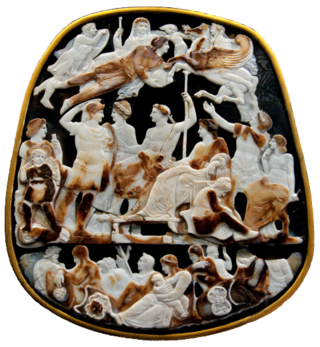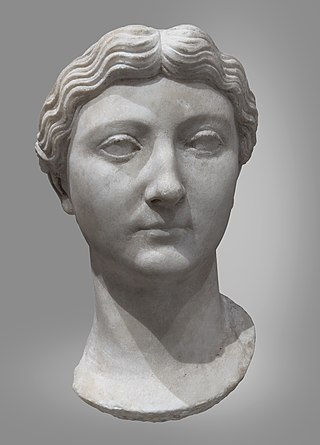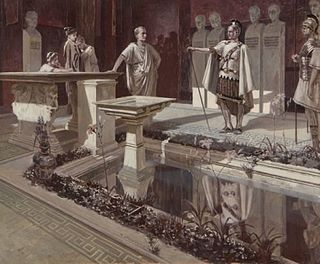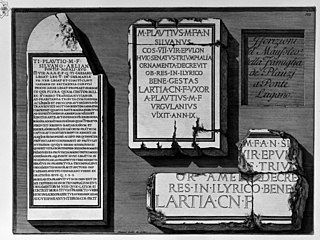
The Julio-Claudian dynasty comprised the first five Roman emperors: Augustus, Tiberius, Caligula, Claudius, and Nero.

Plautia Urgulanilla was the first wife of the future Roman Emperor Claudius. They were married circa 9 AD, when he was 18 years old. Suetonius writes that they were divorced in 24 AD on the grounds of her scandalous love affairs and the suspicion of murder.

Livia Drusilla was Roman empress from 27 BC to AD 14 as the wife of emperor Augustus. She was known as Julia Augusta after her formal adoption into the Julian family in AD 14.
Gnaeus Calpurnius Piso was a Roman statesman during the reigns of Augustus and Tiberius. He served as consul in 7 BC, after which he was appointed governor of Hispania and consul of Africa. Piso is best known for being accused of poisoning and killing Germanicus, the heir of emperor Tiberius.

Aulus Plautius was a Roman politician and general of the mid-1st century. He began the Roman conquest of Britain in 43, and became the first governor of the new province, serving from 43 to 46.

Drusus Julius Caesar, also called Drusus the Younger, was the son of Emperor Tiberius, and heir to the Roman Empire following the death of his adoptive brother Germanicus in AD 19.

Vipsania Agrippina was the first wife of the Emperor Tiberius. She was the daughter of Marcus Vipsanius Agrippa and Attica, thus being a granddaughter of Titus Pomponius Atticus, the best friend of Cicero.

Gnaeus Domitius Ahenobarbus was a member of the imperial Julio-Claudian dynasty of Ancient Rome. Domitius was the son of Antonia Major. He married Agrippina the Younger and became the father of the emperor Nero.
Pomponia Graecina was a noble Roman woman of the 1st century who was related to the Julio-Claudian dynasty. She was the wife of Aulus Plautius, the general who led the Roman conquest of Britain in 43 AD, and was renowned as one of the few people who dared to publicly mourn the death of a kinswoman killed by the Imperial family. It has been speculated that she was an early Christian. She is identified by some as Lucina or Lucy, a saint honoured by the Roman Catholic Church.

FuriaLivia Medullina Camilla was the second fiancee of the future Emperor Claudius.
Marcus Vinicius was twice Roman consul and, as husband of Julia Livilla, grandson-in-law (progener) of the emperor Tiberius. He was the son and grandson of two consuls, Publius Vinicius and Marcus Vinicius.
Marcus Plautius Silvanus was a Roman politician and general active during the Principate. He was consul in 2 BC as the colleague of the emperor Augustus.

Tiberius Plautius Silvanus Aelianus was a Roman patrician who twice served as consul, in 45 and 74 AD. He was the natural son of Lucius Aelius Lamia and the adopted son of Marcus Plautius Silvanus, brother of Plautia Urgulanilla, first wife of the emperor Claudius. It is known he offered up the prayer as pontifex when the first stone of the new Capitol was laid in 70 AD. In some ancient sources he is referred to as Plautius Aelianus, but we learn from an inscription that his full name was Tiberius Plautius Silvanus Aelianus, and that he held many important military commands.
Fabia Numantina was a member of the patrician Fabia gens. Precisely how she fits into this family is not certain; while she is generally believed to be the daughter of Paullus Fabius Maximus and Marcia, a maternal first cousin of Augustus, it is possible that she was the daughter of Paullus' brother, Africanus Fabius Maximus.

Tiberius Claudius Drusus was the eldest son of the Roman Emperor Claudius with his first wife Plautia Urgulanilla. He had one younger sister, Claudia, who was repudiated by Claudius along with Plautia.
Lucius Calpurnius Piso was a Roman senator who was appointed consul in 1 BC as the colleague of Cossus Cornelius Lentulus Gaetulicus. He was also an augur.
Plautius Lateranus was a Roman senator of the first century and member of the influential Plautia gens.

The gens Plautia, sometimes written Plotia, was a plebeian family at ancient Rome. Members of this gens first appear in history in the middle of the fourth century BC, when Gaius Plautius Proculus obtained the consulship soon after that magistracy was opened to the plebeian order by the Licinio-Sextian rogations. Little is heard of the Plautii from the period of the Samnite Wars down to the late second century BC, but from then to imperial times they regularly held the consulship and other offices of importance. In the first century AD, the emperor Claudius, whose first wife was a member of this family, granted patrician status to one branch of the Plautii.
Marcus Plautius Silvanus was a Roman senator, and was praetor elect in AD 24. He held the duumvirate of Trebula Suffenas in AD 23.
The gens Urgulania was an obscure plebeian family at ancient Rome. Few members of this gens are mentioned in history, of whom the most prominent was Urgulania, a friend of the empress Livia, and grandmother of Plautia Urgulanilla, the first wife of the emperor Claudius.










